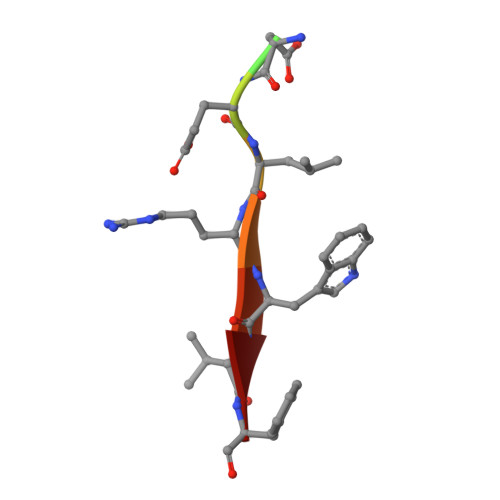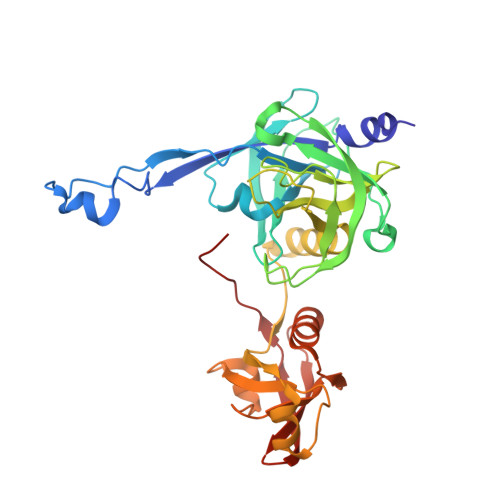Molecular Basis of the Versatile Regulatory Mechanism of HtrA-Type Protease AlgW from Pseudomonas aeruginosa.
Li, T., Song, Y., Luo, L., Zhao, N., He, L., Kang, M., Li, C., Zhu, Y., Shen, Y., Zhao, C., Yang, J., Huang, Q., Mou, X., Zong, Z., Yang, J., Tang, H., He, Y., Bao, R.(2021) mBio 12
- PubMed: 33622718
- DOI: https://doi.org/10.1128/mBio.03299-20
- Primary Citation of Related Structures:
7CO2, 7CO3, 7CO5, 7CO7 - PubMed Abstract:
AlgW, a membrane-bound periplasmic serine protease belonging to the HtrA protein family, is a key regulator of the regulated intramembrane proteolysis (RIP) pathway and is responsible for transmitting the envelope stress signals in Pseudomonas aeruginosa The AlgW PDZ domain senses and binds the C-terminal of mis-localized outer membrane proteins (OMPs) or periplasmic protein MucE, leading to catalytic activation of the protease domain. While AlgW is functionally well studied, its exact activation mechanism remains to be elucidated. Here, we show that AlgW is a novel HtrA protease that can be biochemically activated by both peptide and lipid signals. Compared with the corresponding homologue DegS in Escherichia coli , AlgW exhibits a distinct substrate specificity and regulation mechanism. Structural, biochemical, and mutagenic analyses revealed that, by specifically binding to the C-terminal decapeptide of MucE, AlgW could adopt more relaxed conformation and obtain higher activity than with tripeptide activation. We also investigated the regulatory mechanism of the L A loop in AlgW and proved that the unique structural feature of this region was responsible for the distinct enzymatic property of AlgW. These results demonstrate the unique and diverse activation mechanism of AlgW, which P. aeruginosa may utilize to enhance its adaptability to environmental stress. IMPORTANCE HtrA-family proteases are commonly employed to sense the protein folding stress and activate the regulated intramembrane proteolysis (RIP) cascade in Gram-negative bacteria. Here, we reveal the unique dual-signal activation and dynamic regulation properties of AlgW, an HtrA-type protease triggering the AlgU stress-response pathway, which controls alginate production and mucoid conversion in Pseudomonas aeruginosa The structural and functional data offer insights into the molecular basis underlying the transition of different activation states of AlgW in response to different effectors. Probing these unique features provides an opportunity to correlate the diverse regulation mechanism of AlgW with the high adaptability of P. aeruginosa to environmental changes during infection.
- Center of Infectious Diseases, State Key Laboratory of Biotherapy, West China Hospital, Sichuan University and Collaborative Innovation Center, Chengdu, China.
Organizational Affiliation:


















